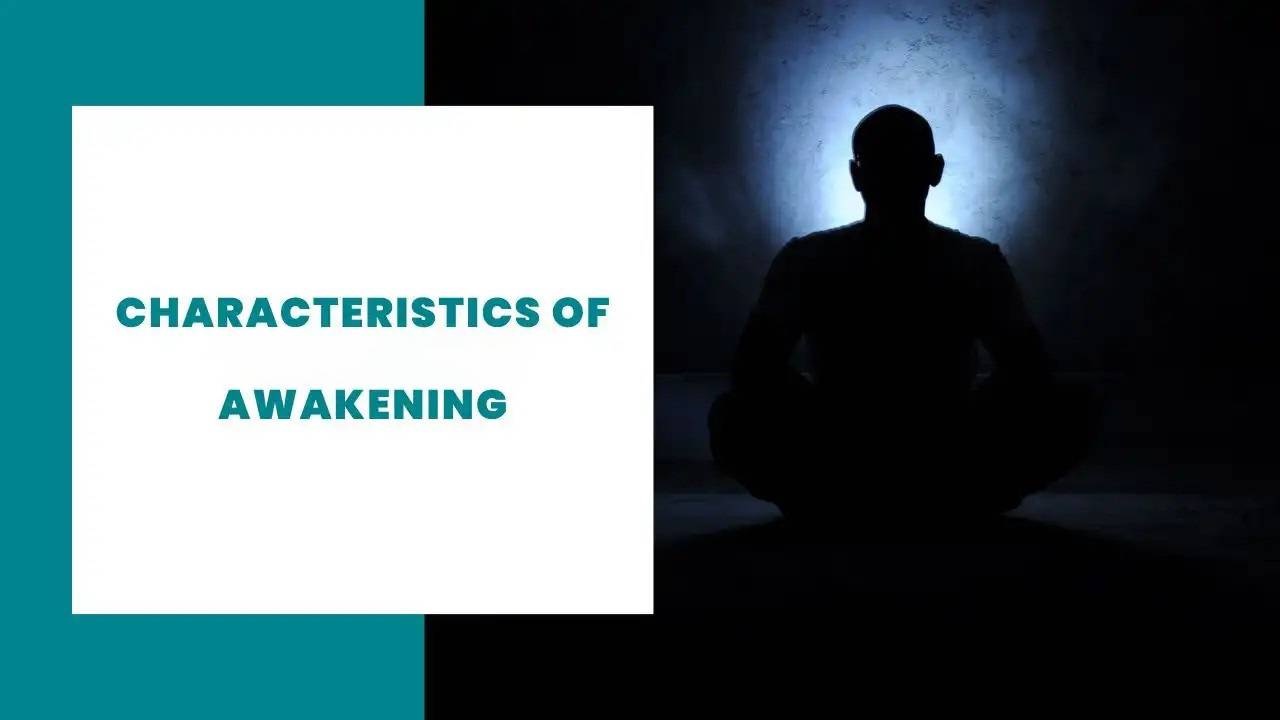觉醒的特征 (中英双语)
The characteristics of awakening
 一.觉醒的特征
一.觉醒的特征
正如你提供的摘录中所描述的那样,觉醒的特征可以被看作是感知、情感、认知和行为的转变,标志着意识从一种更加束缚的状态(通常在精神文献中被称为 "睡眠")过渡到一种扩展的、更加自由的状态。这种转变不仅仅是一种隐喻性的 "觉醒",而是一个人对现实体验结构的深刻转变。让我们来详细探讨这些特征:
感知(感觉)特征:
- 感知能力增强: 感官知觉的清晰度和强度都有所提高,类似于儿童的生动感知。这会让人更深刻地欣赏美、自然和艺术,因为世界显得更加生机勃勃。
- 增强存在感/永恒感: 对时间的体验会发生变化;过去和未来失去了控制,当下的时刻扩大了,变得更加丰富和包罗万象。
内在(情感)特征:
- 认识到神圣的存在/无所不在的精神能量: 高强度的觉醒会让人感知到一种弥漫于万物的精神力量,从而产生一种与万物息息相关的深刻感觉。
- 生命力、和谐与联系: 即使是无生命的物体也能感受到一种生命力,宇宙中弥漫着一种和谐感和固有的善意,从而产生一种与万物合一的感觉。
思想(认知)特征:
这些与觉醒带来的思维过程、信仰和态度的变化有关。虽然节选中没有详细讨论,但它们很可能涉及向不执着、不评判的转变,以及对现实本质的更多理解或直觉。
行为特征:
觉醒也会导致行为的改变,通常表现为同情心、利他主义的增强,以及对社会一致性或自我驱动追求的需求减少。觉醒者的行为可能更有目的性和真实性。
二.为什么会出现这些特征?
1.知觉开放: 随着心理噪音的减少,心灵的过滤器被去除,从而能够更直接地体验现实。
2.心理安静: 随着自我喋喋不休的唠叨安静下来,人们会更加专注于当下,从而增强对现实的体验。
3.能量重新分配: 释放之前被自我维护所消耗的能量,增强感官和情感体验。
4.自我系统转变: 觉醒会将自我系统从以自我为中心、受时间限制的系统转变为更广阔、更注重当下的系统。
从本质上讲,这些特征的产生是由于感官和情感开放性的增强、自我主导地位的削弱以及对现实更直接、更即时体验的重新定位。这种重新定位使人们对世界和自己在其中的位置有了更生动、更联系、更和谐的体验。
在更广泛的背景下,这些特征不仅是个人的体验,而且往往反映在一个人与世界的互动方式上,影响着一个人的自我意识、与他人的关系以及创造性的表达。它们强调了一种根本性的转变,即从生活在分离和限制的状态中转变为生活在统一和无边的状态中。
觉醒的过程涉及到自我意识的转变之旅,在这一过程中,个人会变得更加关注自己的内心状态和周围的世界。觉醒的每一个特征都可以通过具体的辅导问题来探索,从而鼓励人们进行更深入的思考和洞察。下面是一些针对上述觉醒特征的辅导问题:

感知(感觉)特征
增强感知能力:
Q. 你目前是如何用感官体验周围世界的?
Q. 如果你周围的颜色、声音和质地得到强化,会是什么感觉?
增强临场感/永恒性:
Q. 当下的全然存在对你意味着什么?
Q. 你能回忆起有一次你感觉时间延长或减慢了吗?你当时在做什么?
认识神圣的存在/无处不在的精神能量:
Q. 你什么时候感觉到与比你自己更伟大的东西的联系?
Q. 描述一下你感到生活中充满神圣感或灵性的时刻。
内在(情感)特征
生命力、和谐与联系:
Q. 是什么给你带来了生命力和活力?
Q. 你如何在生活中体验和谐?
认识到万事万物都是美好的:
Q. 面对无法控制的情况,你会做出怎样的反应?
Q. 如果你接受万事如意的事实,会有什么变化?
感知一体或联系:
Q. 哪些做法能让你感觉到与他人和环境的联系?
Q. 在日常生活中,你从哪些方面感受到相互联系?
理念(认知)特征
扩展理解:
Q. 你是如何理解那些挑战你现有观念的新想法的?
Q. 最近有哪些学习经历极大地改变了你的观点?
超越个人欲望和恐惧:
Q. 哪些个人欲望和恐惧对你的生活影响最大?
Q. 想象一下超越这些欲望和恐惧的生活是什么样的?
释放过去和未来:
Q. 你经常发现自己沉湎于过去或担心未来吗?
Q. 怎样才能帮助你放下过去,更加专注于现在?
行为特征
利他主义和服务:
Q. 利他主义在你的日常行为中是什么样子的?
Q. 如何在服务他人的同时促进自己的成长?
不执着:
Q. 你目前执着于什么可能会阻碍你的发展?
Q. 如果你能做到不执着,你的生活会发生怎样的变化?
正直和真实:
Q. 你觉得自己什么时候最真实?
Q. 你可以采取哪些措施让自己活得更加正直和真实?
违背规范的勇气:
Q. 你能找出自己曾经因为感觉正确而违背常规的时候吗?
Q. 当你想到要坚持自己独特的观点时,会产生哪些恐惧?
通过思考这些问题,寻求自我认知的人可以深入他们的觉醒之旅,发现更多关于他们自己以及他们如何与世界相处的信息。这些问题并非详尽无遗,但可作为探索个人觉醒特征的起点。
作者:郑振佑博士 Dr.PauL Jeong ,MCC,MMC
------------ENGLISH-----------
The characteristics of awakening
The characteristics of awakening, as described in the excerpt you've provided, can be seen as transformations in perception, emotion, cognition, and behavior that mark a transition from a more constricted state of consciousness (often referred to as "sleep" in spiritual texts) to an expanded, more liberated state. This transition is not just a metaphorical "waking up" but a profound shift in the very fabric of one’s experience of reality. Let's explore these characteristics in detail:
Perceptual (Sensory) Characteristics:
Enhanced Perceptual Abilities: There's an increased clarity and intensity in sensory perception, akin to the vividness perceived by children. This can result in a deeper appreciation of beauty, nature, and art, as the world appears more alive and vibrant.
Increased Presence/Eternity: A shift in the experience of time occurs; the past and future lose their grip, and the present moment expands, becoming richer and more encompassing.
Inner (Emotional) Characteristics:Recognition of Divine Presence/Omnipresent Spiritual Energy: A high-intensity awakening can lead to the perception of a spiritual force that pervades all things, giving rise to a profound sense of connection with all of existence.
Life Force, Harmony, and Connection: Even inanimate objects feel imbued with a life force, and there's a pervasive sense of harmony and the inherent goodness of the universe, leading to a feeling of oneness with all things.
Ideational (Cognitive) Characteristics:These relate to the changes in thought processes, beliefs, and attitudes that come with awakening. While not discussed in detail in the excerpt, they likely involve a shift towards non-attachment, non-judgment, and a greater understanding or intuition about the nature of reality.
Behavioral Characteristics:Awakening also results in changes in behavior, often manifesting as increased compassion, altruism, and a lessened need for social conformity or ego-driven pursuits. The awakened individual may act with a greater sense of purpose and authenticity.
Why These Characteristics Emerge:Perceptual Openness: As mental noise decreases, the mind's filters are removed, allowing a more direct experience of reality.
Psychological Quietude: With the quieting of the ego's chatter, one becomes more anchored in the present, allowing an enhanced experience of reality.
Energy Reallocation: Energy previously consumed by the ego's maintenance is freed, heightening sensory and emotional experiences.
Ego System Transformation: Awakening changes the ego system from one that is self-centered and time-bound to one that is more expansive and present-oriented.
In essence, these characteristics arise due to a combination of enhanced sensory and emotional openness, a reduction in the dominance of the ego, and a reorientation towards a more direct, immediate experience of reality. This reorientation allows for a more vivid, connected, and harmonious experience of the world and one's place in it.
In a broader context, these characteristics are not just individual experiences but are often reflected in how one interacts with the world, impacting one's sense of self, relationships with others, and creative expression. They underscore a fundamental shift from living in a state of separation and limitation to one of unity and boundlessness.
The process of awakening involves a transformative journey into self-awareness, where an individual becomes more attuned to their inner state and the world around them. Each characteristic of awakening can be explored through specific coaching questions that encourage deeper reflection and insight. Here are some coaching questions tailored to each of the awakening characteristics mentioned:
Perceptual (Sensory) Characteristics
Enhanced Perceptual Abilities:
How do you currently experience the world around you with your senses?
What would it be like if the colors, sounds, and textures around you were intensified?
Increased Presence/Eternity:
What does being fully present in the moment mean to you?
Can you recall a time when you felt time expand or slow down? What were you doing?
Recognize the Divine Presence/Omnipresent Spiritual Energy:
When have you felt a connection to something greater than yourself?
Describe a moment when you felt life was infused with a sense of the divine or spiritual.
Inner (Emotional) Characteristics
Life Force, Harmony, and Connection:
What brings you a sense of vitality and aliveness?
How do you experience harmony in your life, and how can you cultivate more of it?
Recognition of Everything Being Good As It Is:
How do you react to situations that are out of your control?
What would change if you accepted that everything is as it should be?
Sensing Oneness or Connection:
What practices help you feel connected to others and the environment?
In what ways do you sense interconnectivity in your daily life?
Ideational (Cognitive) Characteristics
Expanded U
By.Dr.PauL Jeong ,MCC,MMC

 一.觉醒的特征
一.觉醒的特征